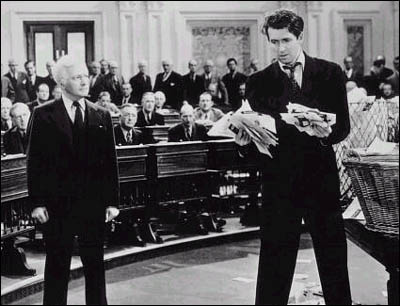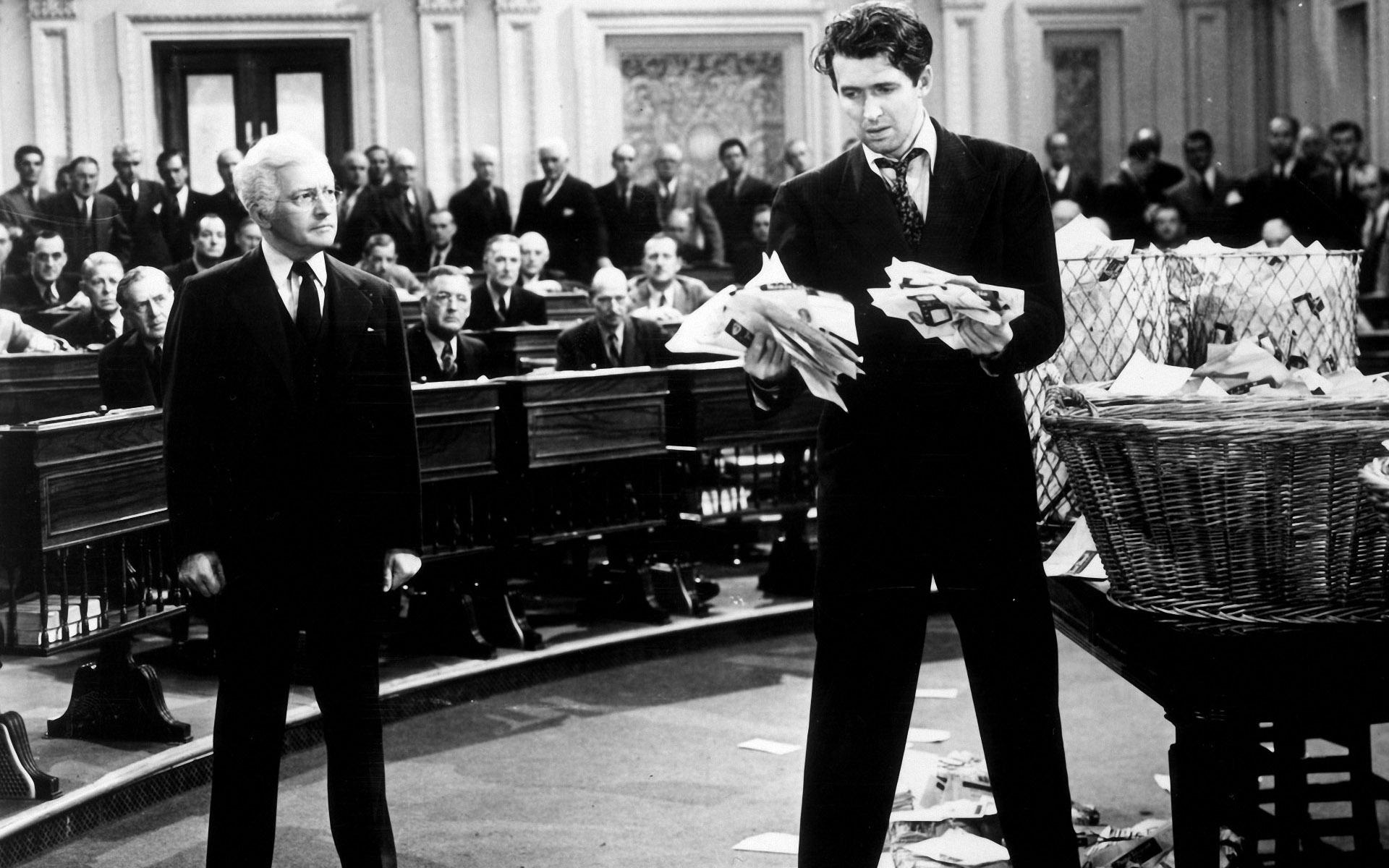[Editor’s note: Are you fan of all things ID4? Don’t miss the Independence Day Overview, our downloadable commentary on the movie. Get it now!]
Since 1939’s Mr. Smith Goes to Washington, Hollywood has repeatedly put forward the thesis that amateurs are the key to fixing things in Washington. Hollywood is dangerously wrong. Left or right, I hope that thinking (and overthinking) people from both sides of the aisle can agree that not every cabin boy can steer the ship of state.
The theme of the amateur “fixing” Washington is so pervasive in fiction that the things we look for in real-life politicians have changed. Where once we looked for larger-than-life heroes: champions of the battlefield, the courtroom, or the legislative process, today we’re looking for someone we’d like to have a beer with. Most pundits agree that this phenomenon was the key to Bill Clinton’s victory in 1992 and (with a little help from the Supreme Court) George W. Bush’s victory in 2000.

From gravitas to glamour shots.
That’s not to say that applying a little folksy charm and a common touch is new to politics. Andrew Jackson did invite the public in to the White House for a big block of cheese, but he was also the nation’s biggest military hero. Julius Caesar slept in the same tents and ate the same food as his legions, but he also conquered France, Germany and the Roman republic.
The Hollywood myth took that small dose of the common touch and made it central to our idea of what a politician should be. It didn’t happen instantly – as recently as the 50’s and 60’s, America looked to its Presidents as exemplars. Eisenhower beat Hitler. Kennedy’s Camelot was what America aspired to become. But then Nixon went down, the Presidency lost a bit of its shine, and we stopped voting for statesmen and started voting for people like us. (Note: Mr. Frost has already picked on him enough, but it’s worth noting that Nixon’s 1952 Checkers speech was a big first step down the road of “I’m just like you.”)
That’s not a good thing. We, as a people, are probably not qualified to be President. On average, we’re not smart enough. We’re not diplomatic enough. We don’t work hard enough. We don’t think strategically. I’m not suggesting that the Presidency should be the exclusive domain of rich Ivy League grads, but it’s not a job that anybody can do.
So while it’s great that social studies teachers tell us that anyone in this country can become president, it’s not in our interest for just anyone to get the job. But cultures run on stories and the story that Hollywood is selling is that the only thing we need to fix this country is a good, old-fashioned average American at the helm. A look at some of the people running for Congress this year shows that we’ve bought it. A peek into the reality behind Mr. Smith Goes to Washington, Dave and Independence Day tells us what we might be in for.
Let’s start with Frank Capra’s 1939 film Mr. Smith Goes to Washington.
Jefferson Smith is the leader of the Boy Rangers. In a fit of good timing, one of his unnamed Western state’s Senators dies just as Smith performs a heroic rescue of some endangered scouts. Smith is duly appointed to replace that Senator. As he takes his place in the Senate, he’s taken under the wing of Senator Paine, a senior Senator in an unnamed leadership position. Paine, it turns out, is also in cahoots with the crooked political boss of their state, Big Jim Taylor.
When Smith introduces a bill to buy land for a national boys’ camp, it turns out that the land he wants is already part of a corrupt Taylor/Paine scheme to build a dam on Willet Creek. The bad politicos frame Smith, suggesting that he will personally profit from his camp bill. Faced with expulsion, Smith is forced to filibuster to convince the Senate that he’s right. It’s a famous scene. Watch it. After a day of impassioned filibustering, Smith passes out from exhaustion. Seeing him go down, Paine has a fit of conscience, attempts suicide, then confesses his crimes on the floor of the Senate, demanding that the body expel him rather than Smith. It would have been nice of him to exonerate Smith before attempting suicide, but a Senator with a crisis of conscience can’t be expected to act rationally.
So imagine you’re a citizen of Smith’s state in 1939, ten years into the Great Depression. There are two options on the table. One is a boys’ camp, a wilderness area that may create 10-15 jobs for local people (FDR’s CCC will probably ship people in to do most of the work). The other is a dam project, which, graft or not, is likely to employ hundreds of local people in construction and provide cheaper power to local communities. If it’s a really rural state like New Mexico or Nevada, it may bring power to these communities for the first time. Which bill are you likely to support?
Meanwhile, it’s 1939 and Smith has got Franklin Roosevelt as President and the leader of your party. (In 1939, all but two of the twenty Senators from Western states were Democrats, so we’ll assume that Smith and Paine are as well). People are still blaming Republicans for the Depression and Roosevelt will probably win reelection, even to a controversial third term. Still, it’s coming up on an election year and Senator Smith has just destroyed the Democratic political machine in his state. He may have just cost Roosevelt 6 electoral votes and a couple of friendly seats in Congress. Think he’s at the top of Roosevelt’s list of callbacks?

When someone asks you to write a letter to your Senator, do it. It works. They get really agitated.
Moreover, he also cost his state a senior Senator who is clearly good at bringing home federal cash. In two years, the Japanese are going to bomb Pearl Harbor and military spending is going to go through the roof, putting a final end to the Depression. Wouldn’t it have been nice to have a Senator who could ensure that some of that money came to your state? Instead, you’ve got Senator Jefferson Smith, who may be popular with reporters and voters, but who is morally opposed to wheeling and dealing and who the other Senators are hesitant to deal with. So while the boys are enjoying the Jefferson Smith National Boys’ Camp, the new $200 million munitions factory and its 1,200 jobs go to the state next door.
Remember the Dream Team of pro basketball players that went to the Olympics in 1992? Magic Johnson, Michael Jordan, Scottie Pippin, Larry Bird, Charles Barkley, et al. They won, because that’s what happens when pros play amateurs (or pros from Croatia).
Which brings us to 1993’s Dave.
Dave is a movie about a Presidential look-alike who gets brought in to run the country when President Bill Mitchell has a stroke and goes into a coma (while having sex with a “Patriotic Secretary”). The tagline: In a country where anybody can become President, anybody just did.
In short order, Dave’s common decency, extensive knowledge of musical theater and can-do attitude remake Washington, put America back on track, expose corruption at the highest levels, and win the heart of the now widowed First Lady Sigourney Weaver. It’s a great movie.
-

Anyone else find it a little creepy that at the end of the movie, First Lady Weaver is sleeping with a guy who looks exactly like her dead husband?
There are two big legislative issues in Dave. First up is a $650 million bill to fund homeless shelters and school lunch programs. The evil chief of staff, Bob “Jafar” Alexander wants to veto this bill, but tells Dave that he can save the shelters if he can cut $650 million from the federal budget.
So Dave calls in Murray, his CPA friend (note: with April upon us, I am currently in the market for a CPA friend, if anyone’s interested), and the two of them spend a night and the next day doing just that. We don’t see a lot of the cuts that he makes, but the ones we do see are a $40 million program to promote the American auto industry and a reduction in payments to military contractors whose programs are behind schedule. Dave saves the homeless shelters. Everyone claps, except for the hundreds of Senators and Congressmen who have defense contractors in their districts, Congressional leaders who generally like to be consulted on little things like the budget (the Constitution gave them the purse strings, after all), and basically everyone in Michigan.
The 2010 Federal Budget in its most distilled form is 192 pages long and takes months to produce. The list of people who worked on from the Office of Management and Budget is four pages long, three columns, and lists four people whose last names start with Z. Ali A. Zaidi, Jeff Zients, Gail S. Zimmerman and Rachel Zinn, we thank you for your hard work.

Posing for pictures with babies is one facet of leadership in which both professionals and amateurs excel.
In 1993, the Federal Budget was $1,409,392,000,000 with a deficit of $255 billion. Dave and Murray have just derailed this carefully prepared budget, alienated a significant percentage of Congress, and spent two full days on this fix, which amounts to 0.045% of total spending. There are probably better uses of the President’s time.
Next up, Dave proposes a program to end unemployment. James Tobin and John Maynard Keynes may agree with him that this is a good idea, but both of them would also note that it’s not going to happen without massive government spending. We’ve already seen what it takes for Dave and Murray to get a piddling $650 million together, where are they going to come up with the billions that this program will take?
Given that Dave has admitted to illegal actions on the part of his Administration and pissed off Congress, the chance of getting this program through is effectively nil, even if he leaves it in the hands of the squeaky clean Vice President Nance. Great intentions, great movie, great performance by Kevin Kline, but this is an idea that’s going absolutely nowhere.
That’s because Dave and Murray are amateurs.
Finally, let’s talk about 1996’s Independence Day.
While not an overtly political movie, Independence Day features an amateur President who can make a mean speech but can’t do much with policy.

This is what happens when you vote for amateurs and/or James Madison.
When we meet President Thomas J. Whitmore, his advisers are telling him that despite his service as a Gulf War pilot, his poll numbers are slipping because he can’t get anything done. “They elected a warrior and they got a wimp,” says the woman who starts as a powerful adviser to the President and ends the film as Jeff Goldblum’s powerless girlfriend.
Cut to the end of the movie. It turns out that having a fighter pilot President may be a good thing – someone’s got to shoot down this spaceship before it blows up Area 51. (No worries that every metropolitan area larger than a military base in northern Nevada has already been destroyed.) President Maverick is up there, the shields are down, he’s ready to take out the ship and his Fox 2 missile fails to fire. If not for the incredible sacrifice of Randy Quaid, the last vestige of American government would have been destroyed and the aliens would have won.
What if, instead of a fighter pilot, we’d elected a former Governor or a pro from the Senate Armed Services Committee, someone who knew how to manage a government bureaucracy?

Fox 2! Missile failure!?!? If only Dave had paid those military contractors!
Perhaps that person could have held defense contractors accountable and ensured that the missiles on America’s fighter planes would actually fire. Perhaps instead of the sniveling Secretary of Defense who failed to mention the fact that we had access to alien technology until after LA, NY and DC were obliterated, a professional President would have appointed a SecDef with some sense of what “need to know” actually means.
We chose wrong, America, and Randy Quaid paid the price. Never again.
(Note: Fenzel had a different take on Whitmore in his ID4 piece last July. Anyone who’s listened to the podcast knows that when Fenzel and I disagree, he’s usually right. Not this time.)
So in November, when you go into the voting booth, don’t let Hollywood lead you astray. Don’t vote for the person with the slick ads that talk about sharing your values. Don’t vote for the Boy Scout, the small businessman, or the fighter pilot. Don’t vote for the guy/gal you want to have a beer with.
Will you be better off voting for the career politician who actually knows how this stuff works? You betcha.
#30#
PS: In my last article, I took Aaron Sorkin to task for writing the worst political speech in history. Today, I’d like to praise Mr. Sorkin for being alone in Hollywood for grasping this concept. 45 minutes of searching didn’t find me the exact quote, but in an episode from the third of fourth season of the West Wing, Sorkin has Toby or Josh present the idea that, somewhere along the line, America forgot that it takes someone extraordinary to run the world’s most powerful country. Help me out in the comments if you know the quote!

“Well, actually…”
President Whitmore’s missile didn’t fail. He successfuly fired it, but it hit the side instead of striking the main weapon. Randy Quaid’s missile DID fail, which is why he had to ram the alien ray gun kamikaze-style.
That being said, clearly Whitmore’s greatest failure was, as you pointed out, not appointing a more competent SecDef. I mean, seriously, “need to know”? “Plausible deniability”? Worst excuses for keeping the President out of the loop EVER.
The comedy King Ralph starring John Goodman perfectly exemplifies yiur point, despite not being about an American president. Ralph, being blue collar working man, discovers the hard way that there’s more to being royalty than smiling and waving to his subjects. The best part of the film is towards the end when he abdicates the throne once he figures out that there’s another heir and that he’s grossly unqualified to be king.
Well “well, actually”‘d sir. Still, if Whitmore had logged a few more hours in the halls of government and a few less in the cockpit, Randy’s missile might have worked.
So last night, unable to sleep after finishing this, I came up with another point.
The underlying disagreement between liberals and conservatives is this:
Liberals see the government as a benevolent place where we come together for the common good.
Conservatives see the government as the great malevolent squasher of individual freedoms and free markets.
If Hollywood is so liberal, why do they keep making films in which the government is a villain? The idea that the average private citizen is more capable of governing than the entirety of the Federal Government is (or was once) the core value of the Republican Party.
They may go on Obama’s jet and raise him some money, but the story that these Hollywood types are selling reinforces the narrative of his opponents.
Hollywood: secret conservative bastion?
The Sorkin quote is from “The Two Bartlets” in the third season: “Yeah, but a funny thing happened when the White House got demystified. The impression was left that anybody could do it.”
I agree whole hearty that a Senator seat should not be appointed to a guy who saves a bunch of Boy Scouts. The Governor of the State should reach out and find the most qualified person and let them buy the seat. You don’t have me on record actually selling the seat, do you? Good.
@DPSquared
Where did you find that? Josh enlisted my help looking for the quotation, and we were googling all last night!
The Overthinking It Army is truly mighty.
The article should have include man of the year!
@mcneil
You must realize that a sub group known as proggresives like micheal moore are pretty anti goverment as the way it is. Just look at how libreals hated the bush administration for enacting the Patriot Act and the Iraq war.
I hope the election of obama will drive amercia away from its current anti platonism mindset.
McNeil, I see a slight contradiction in your example of Whitmore. He was elected on his status as a former soldier- not even a war hero or celebrity like Jackson, Grant, Eisenhower, etc. So yes, he’s an everyman, but what makes him less *politically* qualified pre-election than the real military presidents of our past? If the basis for saying he’s not qualified enough to be president is his lack of political experience, the same would have to be said about those real presidents, too- ones you brought up as exemplars.
I’m not disagreeing with your idea, though. In fact, it’s something the FF’s thought of themselves, hence the implied meaning behind “man” (read: male, white, Protestant, wealthy, business- and/or land-owning) in the Bill of Rights and Constitution, and checks on the dumbassity of the masses (like the Electoral College).
I think it goes a bit deeper than that, even: also relevant here is the role of the “noble idiot” across the board as a folk hero in American cinema and other narrative formats, as well as Americans’ seeming preference for “aw shucks” folk heroes rather than competent people as role models and leaders. See, for example, Being There, Forrest Gump, and All I Really Need to Know I Learned in Kindergarten. (Thought: does this mean that the lack of credit counseling and education in early school settings is the true culprit of the sub-prime mortgage crisis? Because I remember being told VERY little about how to avoid variable rate mortgages at five.) It’s as though Thoreau’s “simplify, simplify” has transmogrified into didacticism for dumbassery, when in fact, there’s a huge difference between living simply and being, well, simple.
I think as a nation we want to be able to say “He’s got character and personality, and that’s what counts!” when that’s not what counts at all. Or, at least it’s only a bit of what counts. What counts much more in making people good at things is training, ability, judgment, and the skill and knowledge to think critically and intelligently about cause and effect, past and present. If you actually think that “Life is like a box of chocolates: you never know what you’re gonna get,” and you’re sitting in, say, the Oval Office trying to decide, say, how or whether to avert a war or other disastrous outcome, this is a huge problem: in government and diplomacy, it’s a really, really bad idea for the sum of your existential and moral perspective be tantamount a giant ellipsis. But again and again, the narrative/cinematic hero is a charming, aphoristic dolt and people love to superimpose this “ideal” on government.